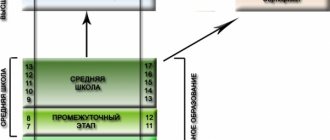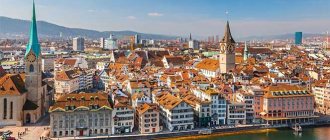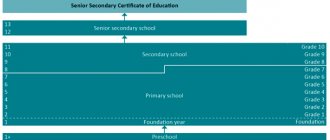Characteristics of higher education in Switzerland
Albert Einstein, Carl Gustav Jung, Leonard Euler, Wolfgang Pauli, Richard Kuhn - these and many other great people glorified their names, stimulated the development of science, and changed history. But first they were educated in Switzerland.
Advantages of Swiss higher education:
- Quality teaching
- Excellent technical equipment
- Large selection of study programs at each university
- Four languages of instruction: German, French, Italian, English
- Serious emphasis on research and practical part in the learning process
- Low tuition fees at public universities
- Opportunity to receive scholarships
- Safety, good environmental conditions, unique nature, social peace
- Multinationality, acquaintance with different cultures
- A diploma that guarantees a well-paid job and career growth anywhere in the world
Advantages of the Swiss education system
When it comes to this state, most people immediately remember the famous watches and ski resorts, but there is another area that is the real calling card of the country - its unsurpassed education: famous universities and elite boarding schools.
Moreover, education here, especially in secondary schools, is focused on foreign students and students, being one of the country’s significant sources of income.
Why studying here is so attractive:
- After receiving secondary education in one of the institutions of this country, the graduate has the opportunity to enter almost any university in the world.
- Depending on the area where the school is located, the student can choose one of five national education programs: German, British, French, Italian or Anglo-American - each of them includes the study of at least 3 additional languages and a specialization (humanities, technical or social sciences) .
Due to the fact that there are four official languages, there is the possibility of deep immersion in the language environment.
- The country's educational institutions have a friendly environment that helps pupils and students from other countries feel at home.
- Schools are usually designed for a small number of students, so each of them is given a sufficient amount of care and attention.
- Children are instilled with a desire for a healthy lifestyle and sports.
- Clean air and excellent environmental conditions have a beneficial effect on the health of students.
- The popularity of Swiss education among our compatriots is also due to the fact that, as in Russian schools, the program is structured very harmoniously, covering many subjects (and not highly specialized, as is customary in modern schools and universities in Europe and America).
- As a rule, schools and private boarding houses are located in the foothills and are upscale mini-resorts, which are very comfortable for every student.
Features of higher education in Switzerland
Switzerland has four official languages: German, French, Italian and Romansh. Therefore, the country is divided not only into 26 cantons, but also into four regions according to the predominant language. The Swiss themselves, from school, in addition to the cantonal language, study one of the state languages and English.
Higher education in Switzerland is represented by ten cantonal universities, two federal universities, nine universities of applied sciences, pedagogical institutes, as well as higher education institutions of music and art. The first two types belong to the most reputable Swiss universities. The language of instruction in each of them corresponds to the language of the region.
Languages of instruction at universities in Switzerland
| Language of instruction | University |
| German | University of Basel, University of Bern, University of Lucerne, University of St. Gallen, University of Zurich, ETH Zurich |
| French | University of Geneva, University of Lausanne, University of Neuchâtel, École Polytechnique Federale de Lausanne |
| Italian | University of Lugano |
| French and German (bilingual canton of Fribourg) | University of Friborg |
Depending on place of residence
Thus, the likelihood that a disabled child will be able to attend a regular school depends greatly on where the family lives in Switzerland. Education here is left to the cantons, including the education of children with special needs. Each of the 26 cantons regulates this by its own law.
“It shouldn’t be like this,” says Pascale Bruderer, a member of the Cantonal Council (minor chamber of parliament) and president of the umbrella association of disabled people’s associations in Switzerland, Inclusion Handicap. According to her, people with disabilities should have freedom of choice. “The Swiss Constitution, the Anti-Discrimination Act and in particular the UN Convention on the Rights of Persons with Disabilities, which also applies in Switzerland, make this clear,” says the politician.
She said children with disabilities should be able to make choices and be able to attend mainstream school. Pascal Bruderer calls on the cantons, and in particular the Swiss Conference of Cantonal Ministers of Education, to take greater action on this issue.
Newsletter
Subscribe to our newsletter and receive the most interesting articles from our site regularly by email
“Today's data, for various reasons, does not allow comparisons between cantons,” Conference President Silvia Steiner told the country's leading television channel SRF. To this end, the Federal Statistical Office is working to collect and process new data, she added.
Quality of education at universities in Switzerland
Switzerland is famous for the quality of higher education and the level of professionalism of its graduates. There is a heavy teaching load behind this. Swiss universities do not identify a dominant format in teaching and use a complex of classes and methods: the curriculum includes lectures, seminars, group assignments, presentations, research, essays, public speaking, practice, reading literature, its analysis, etc.
Swiss universities exclude unconscious cramming. The material must be understood, independently studied and analyzed by the student under the supervision of a teacher. Exams follow the same principle. To prepare for them, there are no ready-made questions - you need to know all the material covered during the semester. The grade is based on all the student’s work during the course.
Benefits of studying in Swiss schools
The best reviews about Swiss schools from students and parents no longer surprise anyone, because the learning process is structured in such a way as not only to provide knowledge, but also to provide children with exciting leisure time. This country is famous not only for its banks and watches, but also for its developed tourism sector, so students’ free time necessarily includes excursions, hikes and a rich cultural program. Students are also encouraged to participate in various clubs, music classes, performing arts and visual arts. Many schools in Switzerland also teach the basics of business, and modern laboratories are available for conducting experiments.
Swiss boarding schools, such as TASIS and Rosenberg, also devote a lot of time to physical development, both as part of the academic program and in the form of additional courses. Therefore, students can engage in a variety of sports: mountaineering, horse riding, aerobics, alpine skiing, football, rugby and even yoga.
The vast majority of Swiss schools are located in ecologically clean regions, which has the best effect on the health of students. All students are under strict supervision of qualified physicians and are provided with a carefully selected diet. Therefore, parents can be absolutely calm about the child’s health.
Work while studying at a university in Switzerland
Higher education in Switzerland requires a mandatory internship. It is paid and lasts from several months to six months. Students are allowed to work part-time - from 15 to 30 hours a week, depending on the region. You can look for part-time work on your own or with the help of the university - for this, every university has a career office.
After receiving the diploma, a foreigner can stay in Switzerland for another six months. If during this time he receives official work, the migration office will issue a permit for further stay in the country.
Preschool education
As in other European countries, preschool education is not compulsory in Switzerland, but most parents send their children to kindergartens. In kindergarten, the child is socialized and prepared to start school. In Switzerland, children are sent to kindergarten early; there are groups even from 4 months. There are public preschool institutions and private ones. Preschool education in Switzerland is not completely free, even in public institutions. The cost of a child’s stay in them is partially covered by the city treasury, the rest is paid by parents depending on the family’s income level. Private nurseries and kindergartens operate flexibly - children can be dropped off for lunch and picked up in the evening. There are no institutions with round-the-clock care for small children in Switzerland.
The method of teaching preschool children in Switzerland in accordance with the canons of reforming teachers is learning through play, and the motto is “don’t interfere”: the child’s abilities will definitely manifest themselves, the teacher just has to notice it. Mathematics and reading and writing are not taught in kindergartens, but there are a lot of games in the fresh air, and instead of the alphabet - repetition of words and sentences, songs and poems. As a result, Swiss preschool children, as a rule, know less than their Russian peers, speak a Swiss dialect and the German language in German-speaking cantons, are better physically developed, without scoliosis, myopia, and are always in a good mood.
Approximately 154,000 children attend pre-school education and training in Switzerland, 48.7% of whom are girls. The share of foreign children was 27.2%. 13,600 people work as educators, 86% of whom are women. There are 4,949 preschool education institutions open in Switzerland, 301 of which are private.
Features of undergraduate studies in Switzerland
Depending on the specialty, undergraduate studies last from three to four years. Swiss universities follow the Bologna education system, therefore they practice a unified cumulative credit system (you must earn 180 credits during your entire study period). At universities there is a lot of independent research and scientific work. Most undergraduate courses at Swiss universities are compulsory; several additional subjects can be studied during the semester.
A bachelor's degree can be obtained not only at universities in Switzerland, but also at colleges and institutes. They are more focused on professional education and the study of applied disciplines.
The level of education
By the way, the fame of Swiss linguistic schools extends far beyond the country's borders. All over the world, graduates of Swiss language schools (Eurocentres, Inlingua or Berlitz) are wildly popular. Yes, what’s there, recruitment agencies “queue behind them” in order to get a first-class specialist. Moreover, studying in such institutions is not only pleasant, but also prestigious.
Along with language learning, you can engage in other activities:
- learn horse riding;
- receive additional education;
- go on excursions.
Language departments are never idle. However, linguistic education is available not only to Swiss children and adult citizens of this country.
Features of master's studies in Switzerland
Compared to a bachelor's degree, in a master's program at a university in Switzerland, students have more freedom: during the whole year they can study three or four compulsory subjects, while the rest are included in the program of their choice. However, the amount of knowledge gained depends even more on personal work. A master's student can take additional disciplines out of interest or take exams in them - then these subjects will be included in the diploma.
Unlike bachelor's degrees, master's degrees offer many English-language programs, even at state universities.
Master's studies at universities in Switzerland last from one to two years. In colleges and institutes - about four.
Are there any advantages to teaching children in schools in Switzerland?
Studying in Switzerland is, first of all, notable for the quality of its diploma. Graduates of local schools can easily enter almost any university in Europe. Upon graduation, the student is required to pass a general exam, the result of which will be indicated in a specialized matriculation certificate, which is the basis for admission to higher schools.
Of course, most parents consider the best schools in Switzerland for their children because of the multiple languages taught here. Moreover, a child studying in local institutions receives conversational communication practice from childhood, which will be useful for further study and building a career in Europe.
Swiss University Rankings
Position of Swiss universities in international rankings for 2021
| University | THE rating | QS rating |
| ETH Zurich | 10 | 10 |
| Federal Polytechnic School of Lausanne | 12 | 38 |
| University of Zurich | 73 | 136 |
| University of Geneva | 98 | 130 |
| University of Lausanne | 146 | 152 |
| University of Basel | 149 | 95 |
| University of Bern | 167 | 105 |
| University of St. Gallen | 372 | 401-500 |
| University of Friborg | 501-550 | 201-250 |
| University of Neuchâtel | – | 401-500 |
The best specialties to study at Swiss universities
According to international rankings, the strongest specialties at Swiss universities are engineering, economics, electronic technology, technical, mathematical and social sciences, and mechanical engineering. This is quite natural, since the basis of the Swiss economy is industry (food, chemical, manufacturing), pharmacology and banking. Due to the great need for technical specialists, both Swiss federal universities are of an applied nature. The École Polytechnique Federale de Lausanne and the ETH Zurich are considered the most respected universities in teaching technical disciplines.
Economics in Switzerland is best studied at the University of St. Gallen and the Bern University of Applied Sciences. The best education in banking and law is provided in Lausanne and Friborg. Humanities specialties are developed at the University of Zurich, Geneva and Lausanne. To obtain an art and architecture diploma in Switzerland, you should go to the Universities of Basel and Bern.
Management, management and hospitality majors are very popular among students at Swiss universities. Among public universities in Switzerland, it is worth paying attention to the universities of Zurich, St. Gallen, Lausanne and Geneva. The most prestigious private institutes and business schools are Cesar Ritz Colleges, European University Business School Geneve, Hotel and Tourism Management Institute Switzerland, International Management Institute Switzerland.
Achievements and difficulties
For his part, Alex Hürzeler, head (minister) of the department of education in the canton of Aargau, defends a system in which the canton decides everything. “If we reach a learning standard where more than 95% of children enter mainstream classes, that would already be a very good figure,” he told SRF.
Barbara Fäh, rector of the Graduate School of Applied Sciences in Specialized Pedagogy External link, sees the goal as integration as much as possible, but also separation when necessary. According to her, a wide variety of children study in Swiss schools: including those with disabilities, highly gifted ones and those who have difficulty with mathematics or reading, as well as those whose language of instruction is not their native one. The child's well-being and development are always at the forefront, she told SRF, which is why individual solutions are required in different cases.
She acknowledged that it is difficult for those directly involved in solving the problem to meet all these different needs. But teachers enjoy support from the authorities, especially teachers for children with special needs. Unfortunately, there are currently too few of them, she said, but schools are a reflection of society and will continue to improve in terms of inclusion for all.
How to enter a university in Switzerland
Due to decentralized management, there is no uniform admission scheme to universities in Switzerland. The easiest way to enroll is in colleges. You must provide a certificate of knowledge of the regional language, a document on previous education, recommendations from teachers and a personal description.
Private universities in Switzerland also have low requirements for applicants. You must know English, have a certificate that confirms this, provide a certificate of past education and undergo an interview with a university representative.
It is much more difficult to get into Swiss public universities. There are no general admission rules: everything depends on the region and the specific university. But traditionally, the strictest rules are dictated by German-speaking universities, and the French-speaking part is considered the most loyal.
Entry requirements for Swiss universities:
- Language certificate. Knowledge of a regional language is required: Italian (CILS), German (DAF or DSH) or French (DELF or DALF). Some universities may conduct their own exams. Sometimes a certificate of English proficiency (IELTS or TOEFL) is also required.
- Document on previous education. Be prepared for the fact that some universities in Switzerland may ask you to take additional subjects that you did not study at school.
- Additional two-year education. This is typical for German-language universities, which do not accept students immediately after school. A college or university in your home country is suitable for completing the required two years.
- Results of the Unified Exam for Entrants to Swiss Universities. It includes five disciplines: mathematics, history, local language and two specialized subjects. There are many preparatory programs for preparing foreigners; the exam itself is held at the University of Fribourg.
- Personal characteristics, letters of recommendation from teachers, interviews, profile tests, portfolios, etc. Each university in Switzerland has its own view on admission, and therefore may have additional requirements.
Options for entering universities through pre-university programs
Schweizer Maturitat
- For whom: schoolchildren over 16 years old
- Where it is held: in schools
- Duration of study 2 years
- Purpose of the course: academic preparation for admission to the best universities in the world
- Study result: high chances of admission to higher education institutions in Switzerland.
Foundation
- For whom: students 17+
- Duration: 1 year
- Goal: comprehensive preparation of students from abroad for university studies
- Study result: a prestigious certificate that gives an advantage when entering leading universities in top countries of the world. Some educational institutions offer automatic enrollment.
A-Level
- For whom: teenagers 15-16+ years old
- Duration: 2 years, shortened one-year program available
- Goal: studying 5-6 subjects of the student’s choice in the first year and 2-3 specialized subjects in the second year of study
- Result: after passing difficult exams, students will receive a British certificate, which is highly valued in the UK and around the world.
Das Deutsche Abitur
- For whom: the German educational program is suitable for students over 16 years of age
- Duration: 2 years
- Goal: prepare students to study at German higher institutions
- Result: a German certificate, which gives a high chance of entering a German university.
International Baccalaureate
- For whom: students 16+
- Duration: 2 years
- Goal: to provide a comprehensive education - a strong base in specialized subjects, to develop personal qualities and strengths
- Result: the diploma of this course is universal and allows you to enter any university in the world.
Cost of studying at university and living in Switzerland
Education at public universities in Switzerland is inexpensive: on average, the cost ranges from $1,000 to $1,500 per year. In private educational institutions, the picture is different: prices below 8 thousand dollars are almost impossible to find, but on average, commercial universities cost 10-20 thousand dollars a year.
The stereotype about expensive Switzerland turns out to be true when it comes to the cost of living: from $400 to $1,000. Without taking into account tuition fees, a Swiss student spends about $1,500 a month to live modestly. Average costs are 2-3 thousand dollars.
Briefly about the most important things
Universities in Switzerland can hardly be called public or cheap. But, we repeat, training will not require critical financial costs, and the admission procedure has been greatly simplified. Higher education of similar class and prestige (USA, UK) often costs significantly more, and the cost of advanced programs is even higher.
Important facts:
- Some higher schools enroll students after 11th grade. You will need a sufficient level of language proficiency (DELF / TestDaF), admission is possible only after taking the preparatory course.
- Other public universities in Switzerland allow admission only after the student has completed 2 courses (4 semesters) at a university in the Russian Federation or any other country.
- It is easier to enroll in private universities, but remember that the actual cost of studying there is higher.
- To enroll in a master's program, you do not need to pass an entrance exam; you will need a “simple” bachelor's degree.
- Public higher education institutions charge a nominal fee of 1000 CHF/year. Private services are much more expensive - from 15 thousand CHF / year.
- The national document on education requires mandatory apostille.
- A diploma from a Swiss university does not provide a significant advantage when searching for a job, but is highly valued by European (American) employers.
- The real cost of living in Switzerland is quite high. One month of training will require financial resources at the level of 1.5-3 thousand USD / year. Therefore, if you want to get a higher education in Switzerland, when receiving a visa you will have to provide proof of financial solvency (25 thousand USD for each year).











